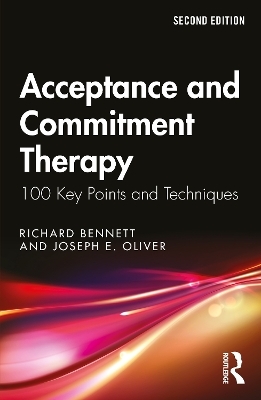
Acceptance and Commitment Therapy
Routledge (Verlag)
978-1-032-71562-9 (ISBN)
- Noch nicht erschienen (ca. März 2025)
- Versandkostenfrei innerhalb Deutschlands
- Auch auf Rechnung
- Verfügbarkeit in der Filiale vor Ort prüfen
- Artikel merken
This thoroughly revised edition explains and demonstrates the range of acceptance, mindfulness, and behaviour change strategies that can be used in the service of helping people increase their psychological flexibility and wellbeing. Divided into three main parts, the book provides the reader with a solid grounding from which to develop their delivery of ACT-consistent interventions. This new edition also includes an update of the research literature and a review of new developments techniques and approaches within ACT theory and practice, fortified with a greater appreciation of diversity issues, such as the application of ACT across different groups and cultures.
This book will be of interest to students and practitioners of ACT from a range of disciplines spanning clinical, organisational, coaching, counselling, and psychotherapy settings.
Richard Bennett works as a Clinical Psychologist and Cognitive Behavioural Psychotherapist and is an Associate Professor of Psychology at the University of Birmingham. He runs a private therapy practice, Think Psychology, and ACTivatingYourPractice.com, offering ACT training and supervision. Joseph E. Oliver is a Consultant Clinical Psychologist, Associate Professor at UCL and founder of Contextual Consulting, providing ACT-focused training, supervision and therapy.
Introduction Part 1: HEAD 1. The Head of ACT – Philosophy and Theory Key Behavioural Principles 2. The 'B' in CBT 3. Learning by Association 4. Learning by Consequence 5. Appetitive and Aversive Control 6. Functional Contextualism 7. A Pragmatic Truth 8. The Function of Behaviour 9. Function Versus Form 10. The Importance of Context 11. Learning through Language and Cognition Relational Frame Theory (RFT) 12. Background to RFT 13. Relational Responding 14. Different Ways of Relating 15. Transformation of Stimulus Functions 16. Coherence 17. Language as a Gift and a Curse 18. The Illusion of Control 19. Experiential Avoidance 20. Cognitive Fusion 21. Rule-Governed Behaviour Key Processes in ACT 22. The Targets of ACT 23. Psychological Flexibility 24. Discrimination and Tracking 25. Widening Behavioural Repertoires 26. A Focus on Process 27. The Hexaflex Model 28. Contact with the Present Moment 29. Self-as-Context 30. Acceptance 31. Defusion 32. Values 33. Committed Action Part 2: HANDS 34. The Hands of ACT – Technique and Practice Assessment and Formulation 35. ACT as a Cognitive Behavioural Therapy 36. Experiential Learning 37. The Utility of Metaphor 38. Retaining a Process Focus 39. Open, Aware, and Active 40. Focussed Assessment 41. Creative Hopelessness 42. Workability 43. Sharing the ACT Model 44. Maintenance Cycles 45. Towards and Away Moves 46. The ACT Matrix Techniques for Moving ACT Processes 47. Techniques for Promoting Contact with the Present Moment 48. Mindfulness with a small ‘m’ 49. Formal Mindfulness Exercises 50. Techniques for Promoting Self-as-Context 51. The ‘Sky and the Weather’ Exercise 52. Perspective Taking 53. Techniques for Promoting Acceptance 54. The ‘Tug of War’ Exercise 55. The ‘Chinese Finger Traps’ Exercise 56. Techniques for Promoting Defusion 57. "I’m having the thought that…" 58. Physicalizing Exercises 59. Techniques for Promoting Values Clarification 60. The ‘Top Ten Moments’ Exercise 61. An alternative ‘Miracle Question’ 62. Techniques for Promoting Committed Action 63. The ‘Values, Goals and Actions’ Exercise 64. Exposure and Inhibitory Learning Structuring Intervention 65. Structuring a Course of Sessions 66. Structuring a Single Session 67. Using Overarching Metaphors 68. The 'Passengers on the Bus' Exercise 69. The 'Lifeline Steps' Exercise Part 3: HEART 70. The Heart of ACT – Context and Strategy ACT in Context 71. Human Suffering is Not a Disease 72. Fundamental Human Requirements 73. Our Clients are Stuck, not Broken 74. The Therapeutic Stance 75. ACT in a Cultural Context 76. ACT and the Medical Model Making Decisions in Practice 77. Process or Protocol? 78. Using Functional Analysis in Session 79. Functional Analytic Psychotherapy 80. Model, Initiate, Reinforce 81. Promoting Practitioner-Client Co-ordination 82. Doing Over Talking 83. Function Over Form 84. Context Over Content 85. Pragmatism Over Truth 86. Working by Addition 87. Increasing Behaviour Over Reducing Behaviour 88. Values Over Goals 89. Ensuring Values do not Become Rules 90. Targeting metaphors Issues Within the Therapeutic Relationship 91. When Control and Avoidance Might be Helpful 92. Self-disclosure 93. Staying Present 94. Awareness of Practitioner Fusion 95. Steering Clear of the ‘Fix-it’ Trap 96. Staying with Difficult Emotions 97. Learning to Love Your Self-doubt 98. Modelling the Model 99. The ‘On Track, Off Track’ Exercise 100. Maintaining Fidelity to the Model Supervision Worksheet
| Erscheint lt. Verlag | 7.3.2025 |
|---|---|
| Reihe/Serie | 100 Key Points |
| Zusatzinfo | 2 Line drawings, black and white; 2 Halftones, black and white; 4 Illustrations, black and white |
| Verlagsort | London |
| Sprache | englisch |
| Maße | 129 x 198 mm |
| Themenwelt | Medizin / Pharmazie ► Medizinische Fachgebiete ► Psychiatrie / Psychotherapie |
| Sozialwissenschaften ► Soziologie | |
| ISBN-10 | 1-032-71562-6 / 1032715626 |
| ISBN-13 | 978-1-032-71562-9 / 9781032715629 |
| Zustand | Neuware |
| Informationen gemäß Produktsicherheitsverordnung (GPSR) | |
| Haben Sie eine Frage zum Produkt? |
aus dem Bereich


